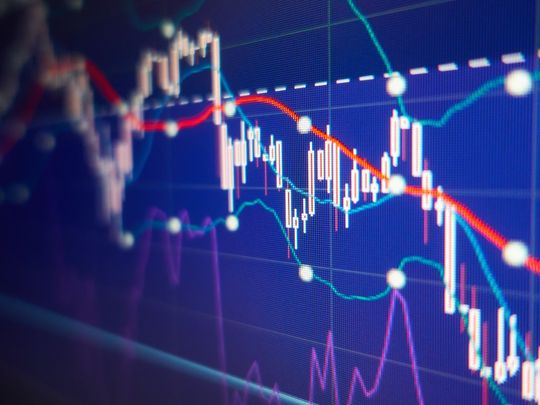
Stocks finished lower Friday after President Trump’s threat of higher tariffs on Mexican imports blindsided investors.
Traders feared the unexpected tariff hike could derail trade negotiations with other countries, and, in the worst case, help usher in a recession.
“We’re in the middle of tariff 2.0,” said Jamie Cox, managing partner at Harris Financial Group. “Markets tend to react badly when things come out of left field.”
The Dow Jones industrial average dropped 355 points, or 1.4%, to end at 24,815. The Standard & Poor’s 500 lost almost 36 points, or 1.3%, to close at 2,752. The tech-heavy Nasdaq fell nearly 115 points, or 1.5%, to finish at 7,453.
Investors instead poured money into the 10-year Treasury – considered less risky during times of uncertainty. Its yield dropped to around 2.14% in afternoon trading, the lowest in 20 months, as bonds rallied. Bond yields and prices move in opposite directions.
Trump goes after Mexico
The tumult started Thursday evening when Trump tweeted that the U.S. would impose a 5% tariff on all Mexican goods coming into the United States starting June 10 until the country’s government addressed illegal immigration on the southern border.
In a follow-up statement, the White House said the duties would escalate further if Mexico failed to take action to curb or stop illegal border crossings. The tariffs would increase by 5 percentage points each month before reaching 25% on Oct. 1.
The higher tariffs also could hit Americans’ wallets. The U.S. imports a variety of goods from Mexico, including avocados, electronics and cars.
Bigger trade concerns
The move also threatens to undermine trade agreements the U.S. is negotiating with countries other than Mexico.
“If you’re the Chinese working on a trade deal with the U.S., just like Mexico did, and you’re inches from an agreement, this puts any good-faith negotiating aside,” Cox said.
Other trade negotiations could be upended as well. Vice President Mike Pence is in Canada, trying to get Ottawa to ratify the rewritten North American Free Trade Agreement, a deal the U.S., Canadian and Mexican governments reached last fall.
The White House is also trying to negotiate trade deals with the European Union and Japan. Earlier this month, Trump delayed imposing tariffs on automobiles and auto parts for another six months.
“Day by day, tweet by tweet, it seems less likely we’ll get a short-term fix on trade,” said Andrew Whalen of Whalen Financial in Las Vegas.
Economic repercussions
Tariffs would disrupt the global supply chain and could turn a slowing economy into a recession, said Cliff Hodge, director of investments for Cornerstone Wealth.
“A lot of psychological damage has been done with multinational corporations,” Hodge said. “The big concern is that the U.S. government won’t operate transparently.”
The tariff fears add to growing concerns among traders that the economy is decelerating. Ballooning business inventories, low inflation worldwide and weaker economies in Europe and China also are weighing on the market, said John Bredemus, head of capital markets at Allianz Investment Management.
A harbinger of recessions – the inversion of the yield curve – also has occurred. That’s when the yield on short-term Treasuries is higher than on longer-term ones, signaling investors are losing confidence in future growth.
The yield on the three-month Treasury has been higher than the 10-year Treasury yield for the seventh straight day – the most inverted since 2007.
“Is it really signaling a recession in the second half of 2020?” Bredemus said. “We know growth is slowing. This could be the tipping point.”





























